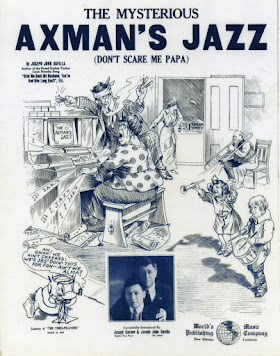March 19, 1975: The movie version of The Who's rock opera Tommy premieres in America.
It’s been said that every musician tries to be cinematic, while filmmakers are praised for musicality. Perhaps no film expresses that more clearly than Tommy, Ken Russell’s 1975 adaptation of The Who’s rock opera.
(sign up to follow by email)
The story, which is little more than a framework for music and images, starts at Tommy’s trauma of witnessing his parents commit a terrible crime sends poor Tommy deaf, dumb and blind, as the song goes. As an adult, played by front-man Roger Daltrey, his heightened sense of touch leads him to discover pinball, becoming a media phenomenon and eventually, a kind of cult leader.
Read more: Little White Lies
March 19, 1919: Jazz music plays throughout New Orleans after a serial killer threatens to murder anyone not listening to it.
The killer, known as "the axe man," had claimed eight victims when he sent a letter to the New Orleans Times-Picayune that was published in their March 14, 1919 edition. It read:
At 12:15 (earthly time) on next Tuesday night, I am going to pass over New Orleans. In my infinite mercy, I am going to make a little proposition to you people.
I am very fond of jazz music, and I swear by all the devils in the nether regions that every person shall be spared in whose home a jazz band is in full swing at the time I have just mentioned. If everyone has a jazz band going, well, then, so much the better for you people. One thing is certain and that is that some of your people who do not jazz it on Tuesday night (if there be any) will get the axe.
As the name implies, he is an axe murderer, breaking into homes and killing inhabitants with an axe - often one belonging to the victims. When the night arrives, the city is filled with jazz music loud enough for the killer to hear. The "axe man" is true to his word, but he does strike again later that year in another attack. He is never caught.
March 19, 1937: R&B singer Clarence "Frogman" Henry is born in New Orleans, Louisiana.
Clarence "Frogman" Henry could sing like a girl, and he could sing like a frog. That latter trademark croak, utilized to the max on his 1956 debut smash "Ain't Got No Home," earned good-natured Clarence Henry his nickname and jump-started a rewarding career that endured for over 40 years around the Crescent City.
Read more: Allmusic
March 19, 1976: The Doobie Brothers release Takin' It To The Streets, their first album with Michael McDonald.
'Takin' It To The Streets' found Mischael McDonald leading the Doobie Brothers in a new rhythm & blues-flavored direction. And earlier in the year McDonald appeared on Steely Dan's 'The Royal Scam' after having recorded and toured with the group previously. And these are not memberships McDonald -- who's been primarily a solo artist since 1982 -- takes lightly.
Read more: Macomb Daily
March 19, 1983: The Pretenders peaked at number 5 with "Back On The Chain Gang."
"Back on the Chain Gang" was recorded after James Honeyman-Scott, the Pretenders guitarist, died of a drug overdose at the age of 25 on June 16, 1982. This came two days after the Pretenders fired their longtime bassist, Pete Farndon, because of his drug abuse problem.
 |
| Chrissie Hynde |
On July 20, 1982, the band began recording the song at AIR Studios in London. At that time, only two Pretenders were left: singer-songwriter Chrissie Hynde who was about three months pregnant with her first daughter, and drummer Martin Chambers. Other musicians were hired to fill out the session: lead guitarist Billy Bremner of Rockpile, and bassist Tony Butler who was already at the studio for a Big Country recording project.
Read more: Fandom
See Me, Feel Me
The Who



No comments:
Post a Comment